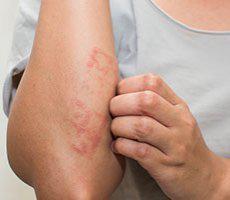What is eczema?
Although most patients think of eczema as a specific condition, it’s an umbrella term referring to a group of inflammatory skin conditions. The most well-known form, atopic dermatitis, is often used interchangeably with eczema. A few other common forms include contact dermatitis, seborrheic dermatitis, and hand dermatitis.
Eczema causes red skin and itching — often severe itching — but other aspects of its appearance vary. Your skin could be red and swollen, or red, dry, and scaly. You may develop a bumpy rash or blisters that ooze, then form a scab.
Symptoms can develop anywhere on your body, but they often appear on your face, neck, elbows, knees, and ankles. When eczema occurs on your scalp, it can cause hair thinning.
What triggers eczema?
Eczema symptoms flare up due to specific triggers. If you have allergies, the substances responsible for your allergies may also trigger your eczema.
Some of the most common eczema triggers are:
- Skin irritants: soap, skin care products, nickel, disinfectants
- Allergens: pollen, food, pet dander
- Environmental: cigarette smoke, heat, high or low humidity
- Emotional: stress
The experts believe that patients with eczema have a gene variation that affects their skin’s natural protective barrier. As a result, your triggers can get through the barrier and cause the itching and skin rashes associated with eczema.
What are hives?
Hives (urticaria) are red, itchy welts that can be identified by a few unique characteristics. Hives can change their shape, and they’re known for disappearing, then reappearing rather quickly. Red hives also turn white if you press them.
The welts may be different sizes, and your itching can vary from mild to severe. If your hives appear daily for more than six weeks, you have chronic hives.
What causes hives?
Hives develop due to an allergic reaction or in response to an illness. The most common triggers include:
- Food allergies, especially peanut, egg, tree nut, and shellfish allergies
- Insect stings and bites
- Allergies to medications and latex
- Poison ivy and poison oak
- Bacterial infections (strep throat and urinary tract infections)
- Viral infections (common cold, infectious mononucleosis)
You can also develop hives when you scratch your skin and from physical triggers such as temperature changes, sun exposure, and a high body temperature.
Since eczema and hives are closely related to allergies, patients often need allergy testing and treatment with immunotherapy. To get started on the road to wellness, call Allergy Asthma and Immunology on Madison or book an appointment online.








